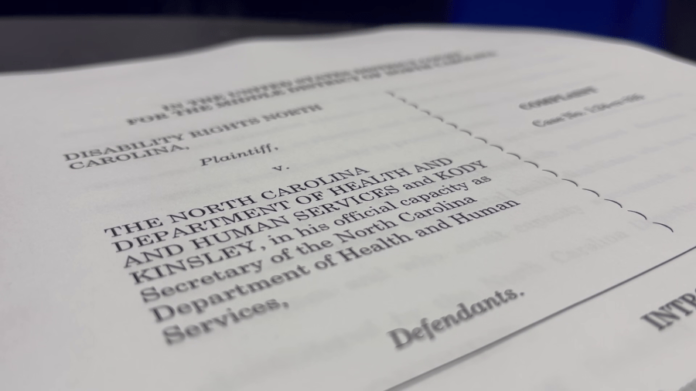
RALEIGH, N.C. (WNCN) — Right now in North Carolina, hundreds of people are being detained for months on end before they’ve ever been convicted of a crime, as they await a mental health evaluation. Now, the ACLU of North Carolina and Disability Rights North Carolina are suing the Department of Health and Human Services, saying what’s happening is unconstitutional.
Jama Hinson’s 38-year-old son Jake is one of those people sitting in a county jail waiting for treatment.
“Jake was arrested May of 2023, Mother’s Day weekend, and has been being held, detained in the Watauga County Detention Center since that time,” Hinson said.
His story isn’t unfamiliar to Michele Delgado, a staff attorney with the ACLU of North Carolina.
“They don’t really understand what the criminal proceeding is, they just know they need psychiatric help, that’s really all they want,” Delgado said of detainees like Jake.
The whole process starts when a person is accused of a crime, and then a lawyer, a judge, or even the defendant themself can request a mental evaluation to see if the person is able to stand trial.
In North Carolina, the Department of Health and Human Services is in charge of facilitating those evaluations at one of the facilities they operate across the state. If a defendant is deemed ITP, or incapable of proceeding, it’s then up to DHHS to place them in a treatment center rather than a jail.
“What we’re seeing is that ITP detainees are waiting on average 68 days just to be assessed, and on average, 145 days just to be admitted to the state psychiatric hospital,” Delgado said.
Now the ACLU and Disability Rights North Carolina are suing over those delays. No statute exists in North Carolina mandating a time frame for the evaluations to be done, but Delgado points to the landmark Jackson court decision, saying detainees can’t be held for unreasonably long periods of time in situations like these.
“People are in these jails decompensating, so waiting 30-plus days is egregious and harmful to them,” she said.
When asked for an interview, a DHHS representative said they don’t comment on pending litigation. But in a 23-page motion to dismiss, the agency says the delays are simply out of their control. In another motion, the agency said rushing the evaluations would have what they call “catastrophic effects on ITP detainees,” and the behavioral health system statewide because of staffing shortages.
Delgado, though, says neighboring states like Virginia are facing the same staffing shortages and not facing these same delays.
“If our neighboring state, who has a comparable size of state as us, can be ordered to do it in seven days, why can’t we do that here?” she said.
Delgado says perhaps most concerning is that when detainees are waiting for an evaluation, they often aren’t given any medication or therapy.
Hinson says that was the case for Jake, who has a history of mental health struggles and paranoid delusions. When arrested, he waited about three months for his evaluation. In October of 2023, Hinson says a judge said Jake is not mentally able to stand trial, and instead him to inpatient treatment. As of July 2024, Jake is still in county jail.
“He has been waiting 266 days to be admitted into Broughton Regional Hospital to receive psychiatric services,” Hinson said. “There’s an unknown, and that unknown, it’s just like one long continuous day for him.”
It’s that unknown that Hinson and Delgado say DHHS has to answer.
“The waiting game for someone with any kind of illness, but particularly someone battling a mental illness, it’s excruciatingly torturous,” Hinson said.
DHHS has filed a motion to dismiss the lawsuit saying in part that the ACLU doesn’t have standing to bring it. The ACLU responded to that motion and filed a separate motion for preliminary injunction.



